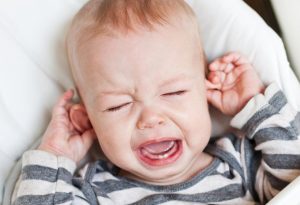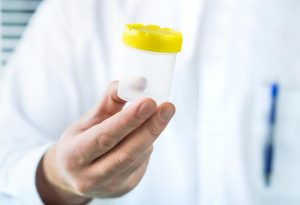In this Article
- What is Toddler’s Diarrhoea?
- How Common Is It in Toddlers?
- Causes of Diarrhoea in Toddlers
- Symptoms of Toddler Diarrhoea
- How Is the Diagnosis Done?
- How Should You Treat Your Child’s Diarrhoea?
- Can You Give Adult’s Anti-Diarrhoeal Medication to Toddler?
- When Should You Visit the Doctor?
- What Can You Do to Prevent Diarrhoea in Toddler?
- Things to Remember
To have your child eat and poop properly is a strong sign of them growing healthily. At times though, their poop can be completely liquid that is similar to how an adult has when on diarrhoea. If this continues for multiple days, your child might be having a condition, termed as toddler’s diarrhoea.
What is Toddler’s Diarrhoea?
On a general note, whenever a person has poop that occurs frequently and is loose and watery, it is termed as diarrhoea. This happens mostly when there is a stomach infection. Within a few days, it disappears and normal bowel movement resumes with proper poop. Toddler’s diarrhoea, on the other hand, refers to a similar condition for kids and last for more than a week. They might have as less as 2 and as much as 10 watery poops throughout the day. These liquid stools might contain small portions of food, improperly digested.
How Common Is It in Toddlers?
This kind of diarrhoea is very different and much rare than usual diarrhoea that most of us have due to stomach infection caused by a virus. Most kids experience usual diarrhoea a bunch of times before they grow up old enough to go to school.
Causes of Diarrhoea in Toddlers
Some of the common causes are,
1. Infection Due to a Virus
Most of the viruses that target toddlers, such as rotavirus, adenovirus, norovirus, astrovirus and a bunch of others bring with them tons of effects like vomiting, pain in the stomach, fever, body ache and so on. Diarrhoea is also one of them.
2. Infection Due to a Bacteria
Stomach infection that is caused due to bacteria takes the form of a food poisoning. Most bacteria like staphylococcus, shigella, e.coli, salmonella, and others are primarily responsible for this. Your kids may suffer from cramping while passing poop, stools having blood, fever, and severe diarrhoea.
Certain infections, such as the ones from e.coli can be extremely dangerous for your kid, even though the others may not.
3. Infection in the Ear
Any kind of bacterial or viral infection in the ear can also be the reason to trigger diarrhoea, mostly in children that are less than 2 years old. Telltale signs of an ear infection are having a cold recently, your kid being fussy all the time, pulling on their ears, or crying due to ear pain. Their appetite may reduce and may vomit as well.

4. Infection Due to Parasites
Parasites usually attack the bowels or intestines and cause diarrhoea. A parasite like Giardiasis makes it home in the bowel and leads to such consequences. The diarrhoea is extremely runny, there is bloating and gas and the child will experience cramps. The parasitic infection usually spreads in places of groups such as childcare homes or so.
5. Effect of Antibiotics
While your child is on antibiotics or has just finished their course, they may experience diarrhoea as a result of it. This is because the medicines affect all kinds of bacteria in the body, even the good ones that are necessary to be present in the intestines.
6. Extreme Consumption of Juice
Consumption of juice that has a lot of fructose or sorbitol, as well as sweetened pulps and drinks can put a pressure on the stomach and result in diarrhoeic stools. Reducing the consumption of juice usually addresses these problems. A glass of juice on a daily basis is good enough for your kid.
7. Condition of Toddler’s Diarrhoea
This can be easily spotted by observing the contents of diarrhoea. If the frequency of passing loose stools is high, the smell is extremely foul, and the stools seem to contain food items or even mucus, then there’s a good chance of it being toddler’s diarrhoea. Most kids stop having this condition in a week or so.
8. Allergy to Food
Food allergy is different from an allergy to a specific food item. This is where your kid’s body will react to the usual proteins found in food in a way that it’s fighting an infection. The immune system of the body can trigger a severe reaction when exposed to them. Milk from a cow, eggs, peanuts, soy, wheat, fish, and many items can fall under this bracket.
Most of the times there’s diarrhoea, gas, and pain. At times, there might be blood in the poop, vomiting, hives, rashes, or even breathing difficulties.
9. Intolerance of Food Items
Where food allergies trigger the immune system, intolerance is the failure to process a particular food item. For a kid who is lactose intolerant, their body fails to produce the enzyme that is required to digest lactose, called lactase. Hence, it stays undigested and causes diarrhoea and gas.
10. Reaction to Poisoning
If there is a possibility that your kid might have accidentally swallowed an external object, or any chemicals, or eaten a wild berry or plant leaf, which is leading to diarrhoea and vomiting, then there is a chance of them being poisoned and it’s necessary to get immediate help.
Symptoms of Toddler Diarrhoea
- More than three liquid watery stools on a daily basis.
- Foul smelling and pale in colour than usual stools.
- Presence of small undigested food bits of a recent meal.
- Slight tummy pain or occasional constipation.

How Is the Diagnosis Done?
If your child has diarrhoea and you call the doctor, he will most likely ask you to observe if it continues for more than a few days. If it does, he will then examine your kid and understand the history of the events that led to it. A stool sample might be taken to check for the presence of blood or other bacteria and viruses. Your doctor might inquire about any food allergies that you might have or any tolerances that might be present in the immediate family, and try to come down to a possible reason that triggered diarrhoea.
How Should You Treat Your Child’s Diarrhoea?
Knowing what foods to give to toddlers with diarrhoea is essential to ensure their health and to manage the condition. This brings a lot of food choices into question. Can a toddler drink milk during diarrhoea? This depends on how they reacted to milk before it. There are a number of treatment options one can make use of to bring some relief from the condition.
Start by introducing more fat based food items in your child’s diet. Fat may not be the best thing for adults, however, it is highly necessary for young and growing children. The diet of a child should contain nearly 40 percent of fat. Opting for full cream milk, yoghurts, puddings and similar items should be encouraged.
Cut down on consumption of fruit juices. These should be restricted as a one-off item, close to one glass of juice a day. For any other time, water is the best alternative to quench the thirst. Many juices contain a lot of sugar that can stay as a residue in the bowel leading to diarrhoea. If your child insists, give them juice that is heavily diluted with water.
The content of fibre in your child’s diet should be a balanced one. Too high fibre is as dangerous as too less of fibrous content. Fibre is generally not digested by the body and comes out as part of the excreta. At the same time, it assists the bowel movements and reduces chances of constipation. Since fibre is present in fruits and vegetables, keep a track of your child’s diet. In case it is low in fibre, increasing it to a normal level is good since fibrous foods absorb excess water in the bowels. If the fibre content is high, it can stress the bowels and cause liquid stools. Hence, it is wise to bring it down.
Providing your toddler with the right food and timely treatment can be the answer to how to stop diarrhoea in toddlers.
Can You Give Adult’s Anti-Diarrhoeal Medication to Toddler?
That is a strict no-no! Adults and toddlers have vastly different bodies, which is why the constituents of the medicine and their dosage amounts vary majorly for both of them. In certain cases, your doctor might recommend giving adult medication in a small amount if the case is severe. But any unsupervised administration of adult medicine on your kid can be quite dangerous.
When Should You Visit the Doctor?
- If your child has been vomiting multiple times throughout the day
- If your child shows strong signs of dehydration, has a dry mouth, fails to urinate even once in six hours
- If there is a presence of blood in the stool or if the stool is black in colour
- If your child is suffering from a fever that is higher than a 102 degrees
- If your child has breathing problems and falls unconscious
- If your child suddenly starts having convulsions
What Can You Do to Prevent Diarrhoea in Toddler?
Maintain a tendency of hygiene in every activity. Wash hands regularly to keep them free from any microbes that can find their way into the body through the mouth. Any toys or objects around the child should be free from contamination and made sterile.

Before and after handling your child or having cleaned his diapers, ensure you wash your hands as well as the child’s hands for a good ten to fifteen seconds, using soap and water.
Things to Remember
- Presence of toddler’s diarrhoea does not forebode any ill for your child. He is still a healthy child who is developing and maturing just like any other child.
- When changing the diet of your child, observe carefully to check if symptoms of diarrhoea are aggravated further or reduced.
- As a child grows, his digestive tract also starts maturing. This brings an improvement in the symptoms of diarrhoea.
- Any unusual conditions that accompany diarrhoea, such as bloody stools, weight loss, fever, movement, or loss of bowel control, should be intimated to the doctor immediately.
Toddler diarrhoea is an uncommon condition but quite a normal one nonetheless. It is the body trying to catch up to the new diet and preparing for the growth cycles. Unless any complications accompany this condition, there is nothing to worry about and your child’s development remains unabated. Most times they can be managed with toddler diarrhoea remedies right at home.








